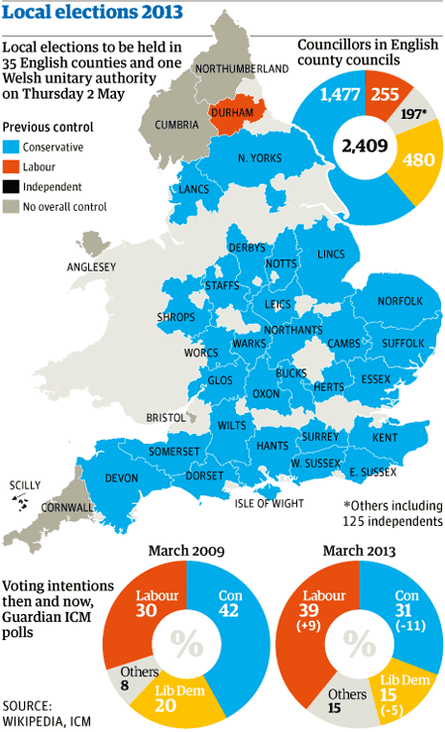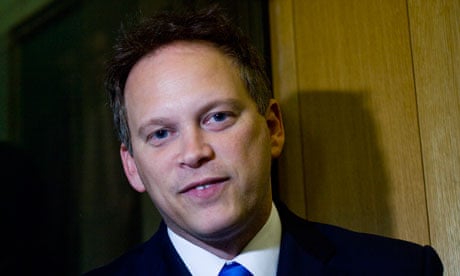Conservatives are preparing for an appalling set of county council election results in May, with one closely involved cabinet member predicting that "terrible will be a great result for us".
The elections spanning 27 county councils and six unitary councils in England and one Welsh council have already been billed as another potential cue for rebellion by Tory MPs unhappy with David Cameron's leadership.
But the political terrain in rural England, the rise of Ukip in the polls and the Tories' very strong performance in the last equivalent elections four years ago, will make the results hard to read.
Grant Shapps, the Conservative chairman, facing his first nationwide test in the role, is braced to lose as many as 500 seats and is billing the elections as a test of whether Ed Miliband's One Nation Labour really has the appeal it failed to display in the Eastleigh byelection.
The scale of the problem facing Shapps and the communities secretary, Eric Pickles, can be understood with a glance at the county council map in England, which is almost entirely blue. The Tories run 29 county and unitary councils, including Buckinghamshire, which has been under Tory control for more than a century, one of the longest periods of one-party rule in democracy. Labour runs only one council and the Liberal Democrats none.
Translate those councils into seats that Shapps has to defend and it looks even worse for the Conservatives. The Tories, according to the elections expert Rob Hayward, are defending 1,477 county council seats, Labour 255, the Liberal Democrats 480 and independents 125.
In 2009 Cameron was riding on the crest of a wave while Gordon Brown was immobilised on the seabed with the full impact of the banking crash just feeding into economic forecasts and his personal popularity at a low. Labour was scoring just 21% in the polls, and duly lost 327 seats, nearly two-thirds of the total it was defending.
Rallings and Thrasher, the local government election experts, said it was a worse performance than Labour's epic defeats in 1967 and 1968. The Tories polled 3,382,211 votes (44%) against Labour's 969,572 votes (13%), with the Lib Dems on 1,841,845 votes (25%) and Ukip 346,410 (5%).
Labour's contemporary poll rating nationally may be close to that of the Tories in 2009, but that does not mean Miliband should win over 1,000 seats. Indeed, Labour officials privately told the party's national executive members last month not to expect to pick up more than a very modest 200 seats as it was all natural Tory terrain, and more of a contest between the two coalition parties.
Nevertheless, Labour has targeted wards it believes it can capture, some as a precursor to trying to win the parliamentary seat in the 2015 general election. At least 45 Labour battleground seats for the 2015 elections have shire elections.
Independent polling experts say Labour should expect to win control in Derbyshire, Nottinghamshire and Lancashire. In a sign that Lancashire is the number one target, Labour is due to hold its launch event in the county this week, but it would have to do tremendously well to gain overall control.
The Lib Dems, on a slow rise in the opinion polls, should hope to win back Somerset and Devon councils from the Tories, in a sign that the party can hold its own in the strongholds where it has sitting MPs. Cornwall, currently under no overall control, might fall back into Lib Dem hands.
But the Lib Dem poll rating poll has fallen sharply since 2009, and no one can yet predict whether Ukip has the organisation or appeal to turn its opinion poll surge into a nationwide advance. It is the first time since 1990 that the county elections have not been held on the same day as the general election and that will depress turnout, which should help Ukip.
It is unclear how many Ukip council candidates will be found, and the party says these polls are a base camp for a larger assault in the European parliamentary elections. But all three main parties will be watching Ukip anxiously to see whether the Tories suffer most from its popularity or whether it eats into the vote of all three parties equally.


Comments (…)
Sign in or create your Guardian account to join the discussion